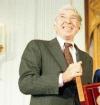Quotes by John Updike
The first breath of adultery is the freest; after it, constraints aping marriage develop.
From infancy on, we are all spies; the shame is not this but that the secrets to be discovered are so paltry and few.
An affair wants to spill, to share its glory with the world. No act is so private it does not seek applause.
Creativity is merely a plus name for regular activity. Any activity becomes creative when the doer cares about doing it right, or better.
We do survive every moment, after all, except the last one.
That a marriage ends is less than ideal; but all things end under heaven, and if temporality is held to be invalidating, then nothing real succeeds.
When I write, I aim in my mind not toward New York but toward a vague spot a little to the east of Kansas.
Writing criticism is to writing fiction and poetry as hugging the shore is to sailing in the open sea.
A leader is one who, out of madness or goodness, volunteers to take upon himself the woe of the people. There are few men so foolish, hence the erratic quality of leadership in the world.
Inspiration arrives as a packet of material to be delivered.
Each morning my characters greet me with misty faces willing, though chilled, to muster for another day's progress through the dazzling quicksand the marsh of blank paper.
The Founding Fathers in their wisdom decided that children were an unnatural strain on parents. So they provided jails called schools, equipped with tortures called an education.
If men do not keep on speaking terms with children, they cease to be men, and become merely machines for eating and for earning money.
The inner spaces that a good story lets us enter are the old apartments of religion.
To be President of the United States, sir, is to act as advocate for a blind, venomous, and ungrateful client.
Rain is grace; rain is the sky descending to the earth; without rain, there would be no life.
But for a few phrases from his letters and an odd line or two of his verse, the poet walks gagged through his own biography.
A narrative is like a room on whose walls a number of false doors have been painted; while within the narrative, we have many apparent choices of exit, but when the author leads us to one particular door, we know it is the right one because it opens.
Most of American life consists of driving somewhere and then returning home, wondering why the hell you went.
Until the 20th century it was generally assumed that a writer had said what he had to say in his works.
Americans have been conditioned to respect newness, whatever it costs them.
Existence itself does not feel horrible; it feels like an ecstasy, rather, which we have only to be still to experience.
Now that I am sixty, I see why the idea of elder wisdom has passed from currency.
There is no pleasing New Englanders, my dear, their soil is all rocks and their hearts are bloodless absolutes.
There's a crystallization that goes on in a poem which the young man can bring off, but which the middle-aged man can't.






